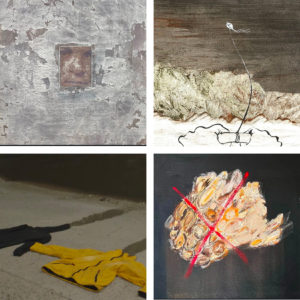What Becomes Known
Ali Fortunato
Diana Haro
Lucia Korpas
Thais Glazman
Tuesday, January 14th – Saturday, January 25th, 2025
Opening Reception: Thursday January 16th, 6 – 8 PM
What Becomes Known – Price List
Atlantic Gallery is pleased to present What Becomes Known, a group exhibition featuring artists Ali Fortunato, Diana Haro, Lucia Korpas, and Thais Glazman, from January 14th through January 25th, 2025. Join us for the opening reception on Thursday, January 16 from 6-8pm.
The four artists in What Becomes Known operate in the spaces where memory, imagination, and emotion each hold a valid claim to reality. Employing distinct modes of inquiry and mediums, each artist grapples with the multiplicity and ambiguity within personal history and conscious experience. Unsettling and at times eerie, the resulting artifacts obscure even as they reveal. The works in this show are signposts in the psychological landscape of the artists who made them, attempts by each to map her way as she navigates through the unknown.
Through experimental image-making utilizing found materials, archival media and ephemera, Glazman collages together personal histories, cultural practices and oral traditions to illuminate the entanglements between the past and present. The artworks in the exhibition comprise a selection of mono-prints and sculptural collage that chart the sensorial landscapes of memory as it relates to folkloric tales, familial loss, and post-Soviet identity. The artist imposes the affects of time through entropic methods, tearing, layering and obscuring images and materials, exploring a visual language of decay and impermanence. The resulting works are evidence, the traces of what remains.
Storytelling through sculpture and video, Haro captures the tension between change and nostalgia. Her sculptural pieces incorporate materials like clay and mirrors in intimate forms, exploring internal conflict and transformation as related to her past, family memories, identity and hometown. Haro’s video work similarly pairs bittersweet archival footage and anamorphic footage of shuffling feet and empty streets in Tijuana, reflecting how trauma, over time, can shape our development, environment, and society. By representing internal battles as moments of stillness and absence, Haro reveals how a desire for change is often countered by the pull of permanence, creating a time / space where all transformation begins and ends.
Beginning with a black ground, Fortunato applies acrylic paint thickly and scrapes in words and symbols. She then traces cellular shapes with charcoal and pastels, creating layered narratives of depth and emotion. These paintings emerge as sacred archives of vulnerability, revealing the unspoken landscapes of her inner world. Fortunato explores the relationships between femininity, fertility, wellness, and disease through a deeply personal artistic process. Described as flat sculpture, her paintings reveal the raw physicality of women’s experiences.
Employing ink and oil paint, Korpas works from both direct observation and subconscious perception to make works that are quiet yet charged. The drawings inked over monotypes – bare outlines laid over impressions of landscapes – feel half-remembered: a ghostly hand’s flashlight washes out the wispy foliage despite the tenuousness of each. In the crepuscular scenes of her oil paintings, an alien figure twists itself up, its searching gaze obscured. By manipulating perspective, she invites viewers to put themselves in her hands and enter the threshold into indeterminacy that she holds open.
Ali Fortunato is a multidisciplinary artist based in Brooklyn, New York. She earned her BA in Studio Art from the University of Vermont, concentrating in painting and sculpture. Fortunato recently completed a Fine Arts residency program at the School of Visual Arts in New York City. She has been featured in group exhibitions and has collaborated with fellow artists on site-specific installations throughout New York City.
Diana Haro is a multidisciplinary artist and award-winning filmmaker from Tijuana, Mexico. With a BA in International Affairs and a Diploma in Contemporary Art Production, her work spans film, sculpture, ceramics, and mirrors. Her debut documentary, Portrait of Absence, earned a grant from the Mexican Institute of Cinema, and her production work won both the Grand Jury and Audience Awards at the 25th Dances with Films festival in Los Angeles. Diana’s art, exhibited in group shows like “Útiles Para el Desmantelamiento de la Visión” at Tijuana’s CECUT, explores memory, identity, and time. She is a member of Brown Girls Doc Mafia and continues to develop film and ceramics projects across Tijuana, New York, and Mexico City.
Lucia Korpas has completed coursework in painting and drawing at Yale University and the School of the Art Institute of Chicago. She recently participated in the School of Visual Arts Artist Residency Program in Fine Art and the Painting Marathon at the New York Studio School. Her work has been shown in group exhibitions. She currently lives in Brooklyn, NY and works from her studio in Long Island City, NY.
Thais Glazman received her B.A. in Visual Arts and Critical Theory from Bennington College in 2016. Glazman has exhibited in solo and group exhibitions and her work can be found in private collections throughout the US. She has been an artist-in-residence at the School of Visual Arts Residency, Instar Lodge, Athena Standards in Greece and a forthcoming residency at Penland School of Craft. She is the recipient of project grants for studio and curatorial projects. She currently lives and works in Brooklyn, NY.
